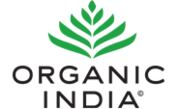ORGANIC FOODS
ORGANIC INDIA is a multi national company founded in 1997 by spouses Bharat Mitra and Bhavani Lev (née Holly Bronfman), daughter of Edgar borman in Lucknow india that produces organic herbal and Ayurvedic health products. The company is most known for their line of organically grown tulsi teas, which are sold in India, the US, Canada, and the UK.
The company created an organic, natural, non-toxic, herbal version of the colorful dyes used in India's annual Holi celebration, and operates a retail store in Maharshtra india The company also exports organically-grown flowers, with Germany as its major market.[4]
Organic India works directly with marginal farmers in tribal villages, providing seeds, fertilizers, organic certification, and assumption of risk in case of crop failure It owns 50,000 acres (200 km2) of arable land in Uttar pradesh including in Rajasthan and Gujarath, and the Vasundhara Acres Organic India LLP in Madhya pradesh.
ORGANIC INDIA’s factory at Agro Park Phase – II Barabanki has
received the Platinum LEED CERTIFICATION under the LEED 2019 New Construction
and Major Renovation-rating System.
LEED, or Leadership in Energy and Environmental Design is an
internationally recognized green building certification program aimed at
helping building owners and operators to be environmentally responsible and use
resources efficiently. LEED is the most widely used green building rating
system in the world. Available for virtually all building, community and home
project types, LEED provides a framework to create healthy, highly efficient
and cost-saving green buildings. LEED certification is a globally recognized
symbol of sustainability achievement.
This is an important accomplishment on many levels due to
ORGANIC INDIA's mission to be a vehicle of consciousness in the
global market by offering wellness solutions in service to community dedicated
to healthy, conscious living — the LEEDs Platinum Certification stands as
evidence of its commitment to the welfare of its community, the environment,
employees and farmer partners.
Buildings have a substantial impact on the health and wellbeing
of people and the planet. Buildings use resources, generate waste and are
costly to maintain and operate. Green building is the practice of designing,
constructing and operating buildings to maximize occupant health and
productivity, use fewer resources, reduce waste and negative environmental
impacts, and decrease life cycle costs.




NICE WORK.KEEP GOING
ReplyDelete